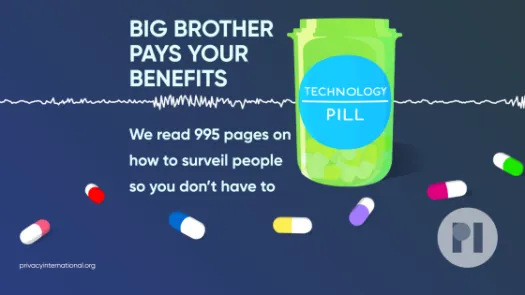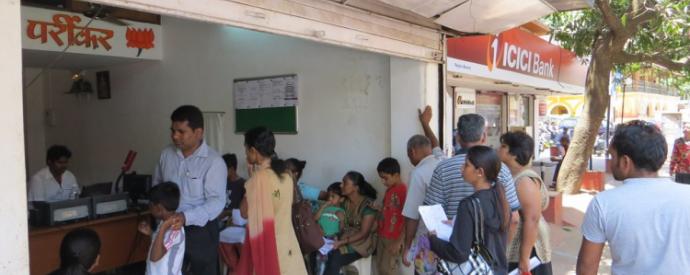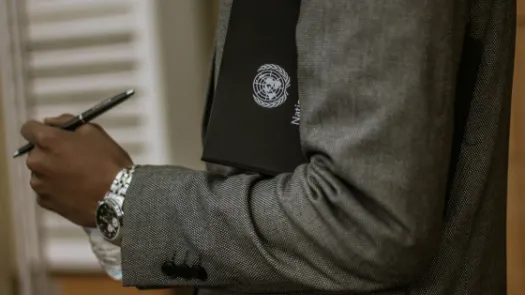
A year into the pandemic, welfare “innovation” continues to penalise the poor
The global Covid-19 pandemic has acted as a catalyst for technology-intensive initiatives for welfare distribution, coming at a high cost to human rights and inclusion: enforcing automated discrimination, exacerbating existing inequalities and compromising access to essential benefits.
- Digitisation of social protection programmes fails to cater for all
- Beneficiaries of emergency welfare programmes are covertly selected
- Inaccurate decisions or wrongful omissions are becoming increasingly harder to challenge

Social protection programmes can be broadly understood as government support for individuals to meet basic human needs, protecting citizens from the “economic risks and insecurities of life”. These policies and programmes are essential to reducing the lifelong consequences of poverty and exclusion. Programmes like cash transfers – including child grants, school meals, skills development and more – help connect families with health care, nutritious food and quality education. To ensure that social protection programmes fulfil their purpose, it is essential that they are made accessible to all without discrimination. This means all individuals should be able to apply for these programmes and also have the right to an accessible and transparent appeal avenue in case of denial of access.
Even before the pandemic, we saw governments pushing for the digitisation and automation of processes within social protection programmes such as the selection of eligible beneficiaries or even initiatives to combat fraud. The current global health crisis has simply come to put the gas pedal to the floor.
Governments justify these technology-intensive initiatives as steps towards minimising fraud, making targeting more effective, being inclusive of the most vulnerable and ensuring transparency along the process. Under the banners of fairness and efficiency, governments are blinded by the idea of modernisation and jump head-first towards these solutions. As we pointed out last year, this approach does not come without its pitfalls.
Fraud and beneficiary identification are indeed challenges within social protection programmes, but technology does not represent an overarching solution for them. On the contrary, it risks leaving vulnerable people locked out of receiving essential benefits while providing governments with the false sense of validation and accomplishment that blind technological innovation intrinsically carries. For example, technology can create hurdles to accessibility and justiciability. Unfortunately there are many examples of country case studies from where one can observe these exclusionary consequences.
Shortcomings revealed: social protection systems ill-equipped to respond to pandemic poverty
Social protection systems at large struggled to meet skyrocketing demand as the pandemic took hold. However, catering for the sudden increase in beneficiaries proved particularly challenging for welfare systems reliant on overly restrictive or bureaucratic requirements - such as the presentation of ID - at a time when unmet basic needs were urgent and widespread.
India: the impacts of digitisation and ID requirements in food distribution
India for instance, has been pushing for digitised solutions for its Public Distribution System (PDS) for the last couple of years. These efforts include linking India's biometric identification system (Aadhaar) to the records at Fair Price Shops that distribute rations among eligible beneficiaries. Under the PDS, the amount of food rations received by qualifying households is determined by the number of family members named under the family ration card. When a family member leaves a qualifying household to join another (through marriage for example), they must register on their new family ration card to ensure they continue to receive food rations. However, doing so is a cumbersome process which, as documented by the Center for Internet and Society, left many women without access to food at a time of crisis.
Even after local governments waived the requirement to present a ration card in order to access food rations, many continued to struggle to receive food. According to a recent study relying on nine unemployed female interviewees, none had received their dry rations regularly during the pandemic, and cooked food services had not been known or available to all. Most of those interviewed did not have ration cards, and had only been able to access rations without a card on a single occasion. As a result, food intake and nutrition had abysmally low levels through the lockdown for all respondents to the study. A sadly striking example of the limits of the Indian food distribution system is the death of Dukhi Majhi, who died from starvation shortly after being refused food rations. Upon investigation, it was revealed that her ration card had been cancelled before the pandemic "due to non-seeding of Aadhaar number". In other words, she was taken off the beneficiary list simply because her ration card was not 'linked' to an Aadhaar number. For Dukhi, the consequences were fatal.
Uganda: widespread exclusion
In Uganda, the government made it mandatory for people to present a national ID card in order to access healthcare and social benefit programs. For context, Uganda's national ID system, Ndaga Muntu, was primarily designed to be a national security system and not a social development program. Even before the pandemic, civil society organisations raised the alarm on Ndaga Muntu's potential for exclusion. A preliminary report by Unwanted Witness on digital ID showed that Ndaga Muntu effectively increased the poverty gap and disease burden amongst Ugandans without IDs.
These concerns were sadly confirmed. A recent report looking into the consequences of these measures confirms that Uganda’s national ID has become an important source of exclusion for the poorest and most marginalized, reiterating that the scope and seriousness of this exclusion goes far beyond what is necessary to reach the stated national security goals of Ndaga Muntu. This same report estimates that at least 23% of Uganda's population is automatically excluded from essential services because they don't own an ID card. Not only are these exclusion percentages dramatically high for a national ID that is now mandatory to access many public and private services, the percentage of the population that is excluded may even be higher. Even those fortunate enough to have been issued a card often face other problems such as the need to correct errors or to undertake the long, bureaucratic process of replacing lost or stolen cards. Directly related to the Covid-19 pandemic, earlier this year the Ugandan government announced that national ID cards would also be mandatory as an eligibility factor for anyone to get a vaccine. Due to external pressure from our partners at Unwanted Witness, the Ugandan government ended up revising this idea and decided to accept other types of ID as a condition to access Covid-19 vaccination. Although there is greater flexibility in the type of IDs people can present now, demanding the presentation of any sort of ID to access something as essential as a coronavirus vaccine is far from ideal.
Hasty solutions: social protection systems developed in response to coronavirus
Facing a sudden rise in poverty, governments worldwide moved to introduce novel benefits to capture 'new' beneficiaries, or to supplement the income of those already on benefits. Devised to provide short-term financial aid to those in urgent need, some of these benefits fell short of their stated goal, or otherwise made it difficult for their effectiveness to be tested.
Colombia: a black-box mystery
In Colombia, the pandemic made the National Development Office (DNP in Spanish) take the impetuous decision of setting up an unconditional cash transfer system for 3 million citizens in just under two weeks, called Solidarity Income (“Ingreso Solidario”). The Solidarity Income was a significant departure from the traditional social policy approach that was in place before the pandemic, which made use of household visits and interviews to identify who would be eligible as a beneficiary. These in person interviews gave potential beneficiaries the opportunity to be involved in the application process and also gave them a better understanding of the system itself. At the same time, in person interviews gave the DNP eyes to evaluate individual circumstances. The Solidarity Income came to radically change the previous approach. In turn, it subverted the relationship between the data used to assign a benefit and the participation of people in the system. Recipients to the Solidarity Income were chosen by reference to undisclosed criteria, with the chosen beneficiaries being notified of their entitlement by SMS. The lucky few were chosen based on a combination of almost 30 distinct databases (privately and publicly owned), and a secret algorithm to decide who is eligible to receive benefits.
Combining these databases has led to thousands of records with inconsistencies and automatic exclusion, with no safeguards for the affected people to have a say. Besides taking advantage of the personal data that individuals leave behind in their interactions with public and private entities, this sort of automation puts a thick and opaque wall between the government and its beneficiaries, leaving many at risk. Civil society organisation Karisma rightly called out the Solidarity Income for what it was: a data experiment in a pandemic.
Bolivia: administrative obstacles to beneficiaries
In response to the Covid-19 crisis, Bolivia introduced no less than three emergency cash transfer programmes: the Family Grant (Bono Familia), the Basic Commodities Grant (Bono Canasta Familiar), and the Universal Grant (Bono Universal). Of all three, the Universal Grant was the broadest in scope: any ID-holding Bolivians aged 18 to 60 were eligible, excluding those in employment and those who were already in receipt of the other Covid-19 benefits.
The law introducing the Universal Grant made clear that, in order to verify that potential beneficiaries were eligible, the government would verify any contributions to pension funds by cross-matching databases. According to a recent report by Derechos Digitales, this provision resulted in mass exclusion, as well as heightened coronavirus exposure.
Due to the cross-matching feature, people whose data was held in outdated pensions databases were automatically excluded from the Universal Grant. Among those affected were those who had lost their jobs in early 2020, as well as independent workers who had at any point in time voluntarily contributed to pension funds. As a result, over 200,000 Bolivians who had made contributions to pension funds prior to the pandemic, but had stopped after their revenue streams dried up, found themselves ineligible on account of remaining "registered" with the pension funds - despite the fact that they had made no recent contributions. The government persisted in its position, forcing hundreds of thousands of Bolivians to attend the pension funds' offices in person at the height of the pandemic to formally withdraw their name from the pensions register. A month before the deadline for applying for the Universal Grant, aspiring beneficiaries were still queuing outside the pension funds' offices - some for the third time - confused about the documentation necessary to formally remove their names from the register.
Any and all of these 'developments' should remind us that welfare decisions, whether reliant on 'black-box' and unaccessible technology, or inflexible eligibility criteria such as the presentation of ID or biometrics checks, often fail to accomplish the goals they set out to by creating ever new types of systematic exclusion by design.
Governments, as well as entities funding social protection programmes abroad, should remain alert to the dangers of exclusion accompanying makeshift Covid-19 solutions. Importantly, implementing entities should be cautious not to set an exclusionary precedent in the management of social protection programmes, which may risk entrenching poverty among affected populations.








